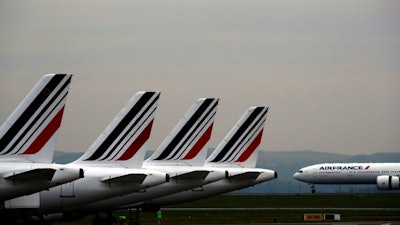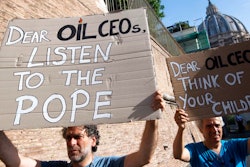
PARIS (AP) — France will introduce a new charge on plane tickets from next year, with revenue used to fund environment-friendly alternatives, the country's transport minister said Tuesday.
The "ecotax" costing between 1.50 euros ($1.7) and 18 euros ($20) will apply to most flights departing in France, Elisabeth Borne said.
The only exceptions will be for domestic flights to Corsica and France's overseas territories, and connecting flights that pass through France. It will not apply to flights arriving in France.
Shares in Air France/KLM and budget airlines EasyJet and Ryanair dropped following the announcement.
Industry group IATA, which favors a system that allows airlines to offset their emissions by paying for carbon reduction efforts elsewhere, called the French ticket charge "misguided."
"National taxes will do nothing to assist the aviation industry in its sustainability efforts," IATA spokesman Anthony Concil said, warning that instead of helping airlines invest in cleaner fuels and technology it could end up harming the French aviation industry and jeopardize jobs.
But the move received a cautious welcome from environmental campaigners, who argue that the airline industry needs to curb its greenhouse gas emissions as part of wider efforts to combat climate change.
"This alone won't do much, but it's at least a recognition by the French government that more is required," said Andrew Murphy, an air travel expert at Brussels-based group Transport and Environment.
According to Borne, domestic and European flights will be taxed at 1.50 euros for economy tickets and 9 euros ($10) for business class, rising to 18 euros for business flights outside the EU.
By comparison, Britain's air passenger duty for standard passenger planes starts at 13 pounds ($16.20), rising to a maximum of 172 pounds ($214.20), and generates more than 3 billion pounds in Treasury revenue every year.
The French tax is expected to raise over 180 million euros ($200 million) from 2020 to invest in eco-friendly transport infrastructure, including rail. It comes on top of a similar ticket charge introduced over a decade ago by former French President Jacques Chirac, the proceeds of which go toward medical aid for poor countries.
Murphy said the French move could boost efforts to introduce a Europe-wide tax on aviation to reflect plane travel's environmental impact.
Germany, Italy and some Nordics nations also have ticket taxes. Several European countries are meanwhile pushing for the VAT exemption that airline fuel enjoys in Europe to be dropped.
Germany's Environment Ministry said Tuesday it supports discussions on additional CO2-based pricing systems for air travel to reduce the industry's contribution to man-made greenhouse gas emissions, currently estimated at more than 2% but forecast to grow significantly in coming decades.
"What's more, the conditions for competition between air, road and rail travel need to be made fairer," the ministry said in a statement. "This is something we in Europe need to achieve together."






















